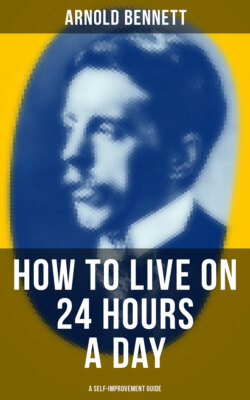HOW TO LIVE ON 24 HOURS A DAY (A Self-Improvement Guide)

Реклама. ООО «ЛитРес», ИНН: 7719571260.
Оглавление
Arnold Bennett. HOW TO LIVE ON 24 HOURS A DAY (A Self-Improvement Guide)
HOW TO LIVE ON 24 HOURS A DAY (A Self-Improvement Guide)
Reading suggestions
PREFACE TO THIS EDITION
Table of Contents
I. THE DAILY MIRACLE
II. THE DESIRE TO EXCEED ONE'S PROGRAMME
III. PRECAUTIONS BEFORE BEGINNING
IV. THE CAUSE OF THE TROUBLES
V. TENNIS AND THE IMMORTAL SOUL
VI. REMEMBER HUMAN NATURE
VII. CONTROLLING THE MIND
VIII. THE REFLECTIVE MOOD
IX. INTEREST IN THE ARTS
X. NOTHING IN LIFE IS HUMDRUM
XI. SERIOUS READING
XII. DANGERS TO AVOID
Отрывок из книги
Arnold Bennett
I have received a large amount of correspondence concerning this small work, and many reviews of it—some of them nearly as long as the book itself—have been printed. But scarcely any of the comment has been adverse. Some people have objected to a frivolity of tone; but as the tone is not, in my opinion, at all frivolous, this objection did not impress me; and had no weightier reproach been put forward I might almost have been persuaded that the volume was flawless! A more serious stricture has, however, been offered—not in the press, but by sundry obviously sincere correspondents—and I must deal with it. A reference to page 43 will show that I anticipated and feared this disapprobation. The sentence against which protests have been made is as follows:—"In the majority of instances he [the typical man] does not precisely feel a passion for his business; at best he does not dislike it. He begins his business functions with some reluctance, as late as he can, and he ends them with joy, as early as he can. And his engines, while he is engaged in his business, are seldom at their full 'h.p.'"
.....
Well, you of the minority, let us assume that the intensity of your daily money-getting will not allow you to carry out quite all the suggestions in the following pages. Some of the suggestions may yet stand. I admit that you may not be able to use the time spent on the journey home at night; but the suggestion for the journey to the office in the morning is as practicable for you as for anybody. And that weekly interval of forty hours, from Saturday to Monday, is yours just as much as the other man's, though a slight accumulation of fatigue may prevent you from employing the whole of your "h.p." upon it. There remains, then, the important portion of the three or more evenings a week. You tell me flatly that you are too tired to do anything outside your programme at night. In reply to which I tell you flatly that if your ordinary day's work is thus exhausting, then the balance of your life is wrong and must be adjusted. A man's powers ought not to be monopolised by his ordinary day's work. What, then, is to be done?
The obvious thing to do is to circumvent your ardour for your ordinary day's work by a ruse. Employ your engines in something beyond the programme before, and not after, you employ them on the programme itself. Briefly, get up earlier in the morning. You say you cannot. You say it is impossible for you to go earlier to bed of a night—to do so would upset the entire household. I do not think it is quite impossible to go to bed earlier at night. I think that if you persist in rising earlier, and the consequence is insufficiency of sleep, you will soon find a way of going to bed earlier. But my impression is that the consequences of rising earlier will not be an insufficiency of sleep. My impression, growing stronger every year, is that sleep is partly a matter of habit—and of slackness. I am convinced that most people sleep as long as they do because they are at a loss for any other diversion. How much sleep do you think is daily obtained by the powerful healthy man who daily rattles up your street in charge of Carter Patterson's van? I have consulted a doctor on this point. He is a doctor who for twenty-four years has had a large general practice in a large flourishing suburb of London, inhabited by exactly such people as you and me. He is a curt man, and his answer was curt:
.....